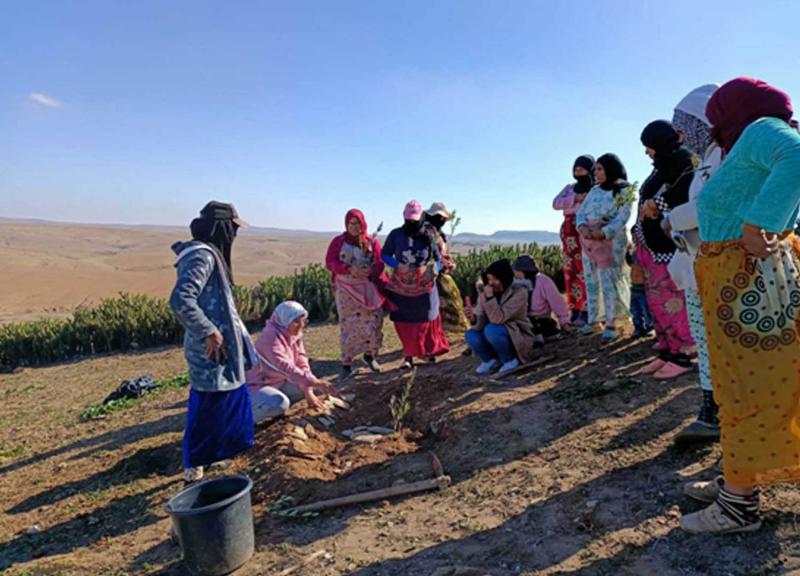For many organizations and agencies around the world, the matter of scaling local successes of development remains a seemingly insurmountable challenge and obligation. When participating in conferences, strategic planning, open forums, and studies on this critical necessity, so much of the consideration is focused on technological matters. If only we can effectively enable farmers to adopt innovative systems of water management, for example, or renewable energy, or agriculture, or product processing, then families, communities, and countrysides will achieve the essential qualities of sustainable development: greater income, better health, improved access to education, and much greater opportunities.
By Yossef Ben-Meir
However, in our experiences in Morocco as part of a Moroccan-American organization committed to community-driven development to achieve sustainable outcomes, it is not the adoption of technical innovations or necessarily the incorporation of smart approaches to cultivation, as important as these kinds of measures can be. Our challenge to scale, which is so pervasively experienced, is that we do not have the human resource power to catalyze widespread community movements that enable local people to determine their priority goals and implement the projects they seek most of all. This is to say that in our case, our ability to build innovative infrastructure for cultivation of endemic fruit tree varieties in 302 rural municipalities involving more than 15,000 people since 2023 has well exceeded our ability to facilitate workshops that manifest communities’ empowerment, participatory planning, and control over their development course.
What we mean by the process of creating our own empowerment is an introspective, personal experience conducted in group settings that involves the participants exploring their social relationships, emotions, and outlooks of work, money, spirituality, body, and their most heartfelt visions of their developed future. The local initiatives that emerge from the intensive personal and community analyses are strongly associated with sustainability because they directly reflect the sincerest objectives of the participants who have identified them.
The ability of trained facilitators who are able to assist individuals and members of communities as a whole, both women and men, in this meaningful way requires very significant experiential training over time guided by dedicated coaches. Our organization, feeling very grateful to have fifteen such trained facilitators of empowerment and participatory approaches, is literally at the fraction of the number we need to extend our work in all the locations it is needed, for example, enabling these kinds of processes to unfold where the demand for fruit trees, water containment infrastructure, and other essential projects are requested of us.
We and others in Morocco and places around the world recognize the key function of capable facilitators of community empowerment and inclusive action and find it unfortunate that we have a serious shortfall in our ability to respond to all the neighborhoods and communities that invite our service. At the same time, there is actually a worrisome consequence when implementing development (e.g., fruit tree planting) not born from the community-wide empowerment process itself even when requested by farmers.
For example, since women own less than 15 percent of land on earth, where fruit trees are planted (commonly within the male-dominated agricultural sector) devoid of the empowered communities’ decision making and more widespread benefits of the outcomes, a real possibility is created to actually further stratify gender-based inequality. Alternatively, projects that are born from the community empowering approach to change not only generate the direct benefits from, in this case, higher yields and income from fruit tree cultivation, but also, as we have seen, increases in rates of women’s literacy and girls’ participation in education, addressing a harsh condition of poverty in rural Morocco and elsewhere.
Much of today’s climate action work focuses on experiences that emphasize technology-led development. However, policymakers, members of development organizations, and action researchers need to bear in mind that failing to first secure a total commitment and fulfillment of local organizing and participatory decision-making may very well enhance the availability of products and services, income, and economic activity but undermine shared growth and create even greater divisions and burdens among people who have been marginalized in generations and centuries past.
A sustainable, equitable, and appropriate way to scale is by first building our teams of group-based empowerment animators and conveners from within local communities to create and manage the change they seek. It is then when relevant technologies and innovations can be more readily introduced and in fact find their most efficient way of achieving scale, which is on the back of community movements.
For us in Morocco, at the very top of our wishlist are the people from all the nation’s regions, speaking all languages and dialects, inflecting the background of the identities that constitute this country and their experiential learning in real community settings and the empowerment activities that support people as they realize their limiting beliefs and, in their place, affirm what they have wanted for so long. Therein, we will find the scale.
Thankfully, this country seeks out all people’s participation in their own development. Then, too, we will realize the fitting of technology into people’s self-determined project development and not technology determining the development pathways of the people.
Dr. Yossef Ben-Meir is President of the High Atlas Foundation and lives in Marrakech, Morocco.






